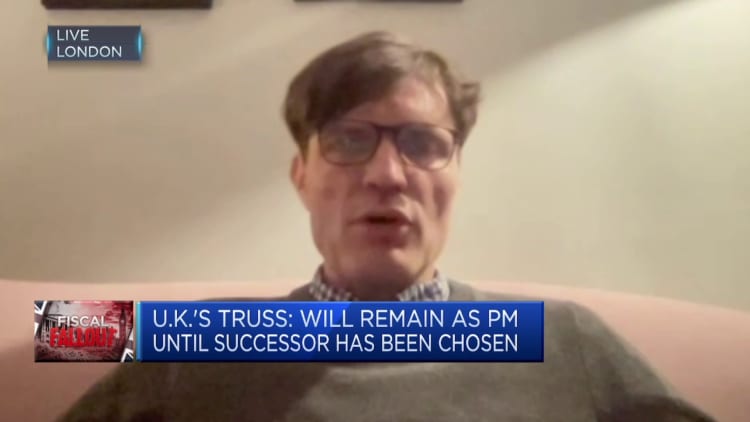LONDON — The British pound pared losses late Friday, after earlier wiping out the moderate gains it made following the resignation of Prime Minister Liz Truss.
Sterling was last up by 0.6% against the dollar, after some weakness for the greenback.
It had been down as much as 1.4% as rumors swirled over who the new PM would be.
Truss announced she would be stepping down Thursday, saying she could not deliver the mandate on which she was elected just 44 days prior. Her successor is expected to be chosen within a week by politicians and members of the ruling Conservative party.
The pound was rocky through Thursday, but ended the day slightly higher than the previous session.
Loading chart...
"The pound has been susceptible to the broad strength in 'king dollar' today and reaffirms our view that what we saw yesterday — and even the prospects of a Rishi Sunak leadership – is not 'game changing' to GBP markets," Viraj Patel, senior strategist at Vanda Research, told CNBC.
"Overseas investors are likely to see this political volatility as another reason to get out of U.K. assets."
Sunak, who was finance minister under former Prime Minister Boris Johnson and ran head-to-head against Truss for the leadership over the summer, is considered a favorite to replace her.
During the campaign, he warned that Truss' plans for massive tax cuts would lead to "higher inflation, higher mortgage rates and eroded savings" and cause a sell-off in bond markets — which is exactly what happened, sparking calls for her to resign.
A month of turbulence
Loading chart...
While the pound was already in decline against the dollar, which has rallied massively against other currencies this year on Fed rate hike expectations and stock market volatility, it plunged following the controversial 'mini-budget' on Sept 23, which contained billions in unfunded tax cuts. Sterling hit an all-time low against the greenback on Sept. 25.
However, the currency saw some upticks when the Bank of England started emergency bond-buying on Sept. 28 and the reversal of almost all of the tax cut plans was announced on Oct. 17.
Peter Toogood, chief investment officer at Embark Group, told CNBC's "Squawk Box Europe" Friday that sterling was "still very weak and likely to stay weak."
"We have a fiscal deficit, we have a current account deficit, and we are at the behest of the kindness of strangers continuously, and have been for many decades, in practice," he said.
Toogood added that he believed the U.K. was already in a real recession, as figures published Friday showed a sharp slowdown in spending for September, with a nominal recession — meaning a contraction in GDP — to shortly follow. U.K. GDP expanded by 0.2% in the second quarter, but the inflation rate has risen to over 10%, squeezing consumer spending power and putting pressure on businesses.

There is now uncertainty over what direction Britain's new leader will take the country's fiscal policy, whether new Finance Minister Jeremy Hunt will still provide a budget update with an independent economic forecast on Oct. 31 as planned — and even whether he will still be in post by then.
However, Vanda Research's Patel said in a note: "Reports that a new PM would delay tax hikes and spending cuts seem odd.
"They wouldn't last for long if they did choose to take this route … markets would quickly 'vote them out.' My initial sense is 'nothing changes' on the policy front — and if anything Sunak would double-down on trying to get inflation down as he pledged throughout the campaign."
Against this complex backdrop, the Bank of England meets Nov. 3 to decide whether and by how much to raise interest rates, after hiking by 50 basis points in September.


